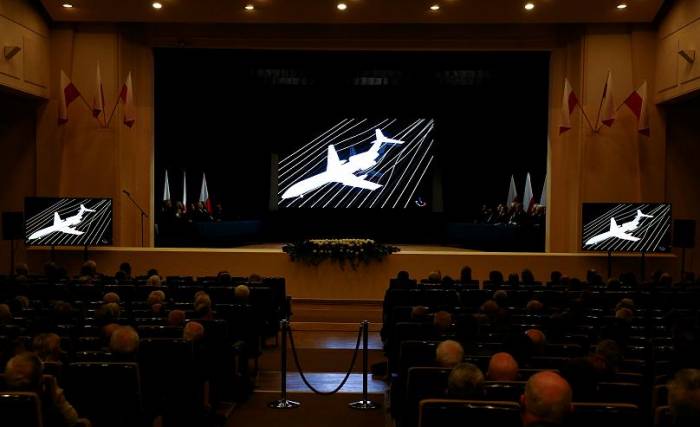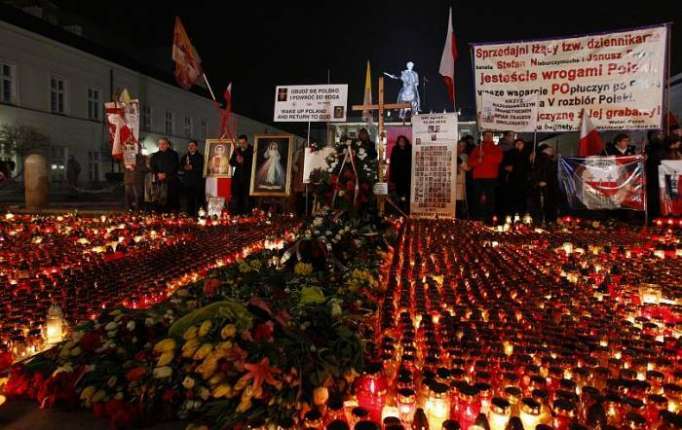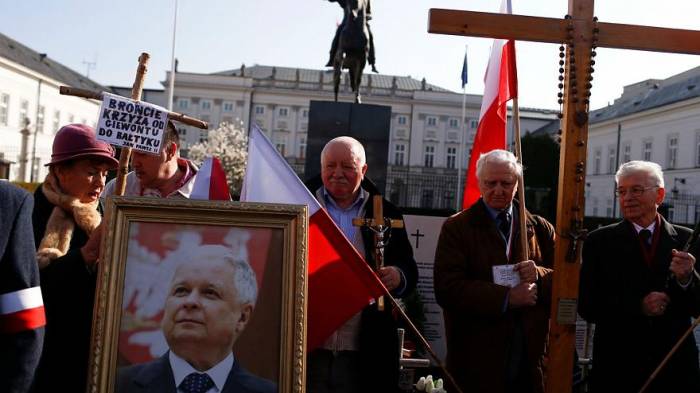It starts with an eight o’clock morning Mass at the 17th century baroque Carmelite Church, located next to the Presidential Palace in the heart of Warsaw, to commemorate the tragic death of his twin brother in a plane crash in Russia’s city of Smolensk on April 10, 2010.
The presidential delegation with Lech Kaczyński and 95 top politicians and military elite on board was on its way to attend the anniversary of the 1940 massacre of thousands of Polish officers by Josef Stalin's secret police during World War II in Katyn forest, near Smolensk.
In the evening Jarosław Kaczyński, surrounded by top ministers and hundreds of mostly pensioners holding birch crosses and framed pictures of his twin brother and his wife, attends a second Mass followed by a Rosary procession to the Presidential Palace where he climbs up a small stepladder to give an emotional speech.
Police block the surrounding streets to ensure the event can pass without interruption.
Victims of the disaster have been honoured alongside World War II heroes in speeches and on monuments. Every month for years, Kaczyński assured the crowd that he would soon be able to reveal the truth behind the presidential plane crash and pledged that those responsible would be held accountable.
The theories
Two official investigations conducted by both Russia and Poland — under its previous Civic Platform government — concluded that the catastrophe was an accident caused by pilot errors attempting to land the Soviet-era Tupolev Tu-154 plane at an airfield covered in heavy fog that lowered the visibility below the minimum required standard.
Additionally, the Polish commission blamed the Russian air traffic controllers for providing pilots with incorrect landing instructions, which made them believe that they were on the right course to land.

But Jarosław Kaczyński refused to accept the findings of the reports and has since created an emotional narrative claiming that top politicians of the former Civic Platform government helped to falsify them in order to disguise Russia’s involvement in the assassination of his brother for supporting Georgia during the armed conflict with Russia in 2008.
When it came to power in 2015, the PiS set up a governmental Smoleńsk sub-commission led by then-Defence Minister Antoni Macierewicz to re-investigate the crash.
Since then, the commission has proposed a variety of possible causes for the blast, including the use of an untraceable explosive to blow up the aircraft. Commission members and outside consultants have used sausages, Red Bull cans and a paper aeroplane to illustrate the possible causes of the disaster.
However, members of the commission have refused to examine evidence uncovered by the Russian inquiry, which had access to the crash site on the ground, on the basis that the scene has been manipulated.
Poland’s official commission during the Civic Platform’s rule also had access to the crash site and did all investigations in the field.
Euronews contacted Macierewicz and his spokeswoman several times in the three weeks leading up to the publication of this story, however, he was unable to find time to discuss the issue with us.
Tomasz Sakiewicz, editor in chief of the right-wing news magazine Gazeta Polska and chairman of the Polish Independent Publishing Company, dismissed criticism of the commission
“The problem is that there is a witchhunt against the inquiry carried out by this sub-commission which relies on the stupidity of journalists. Unfortunately, many journalists have proved to be naïve enough to spread unfounded reports” to ridicule its work, he said.
Sakiewicz’s media outlets publish almost daily stories about the crash.
The PiS has also launched school competitions encouraging junior high school and high school pupils to independently verify the causes of the aeroplane disaster, arguing that they should develop their own opinions regarding the alleged manipulations surrounding the Smoleńsk catastrophe.
Bożena Dzitkowska, deputy-head of the Education Office in Białystok who oversees teaching in schools in the conservative eastern region of Podlasie, dismissed concerns that students would come into contact with conspiracy theories or propaganda around the incident.
“Why do you think that we should be afraid to search for the truth?” she asked. “Searching for the truth is good in itself because the truth is good in itself. The truth is of supreme value. Let them do the research.”
A religion
Zbigniew Mikołejko, professor and philosopher of religion at the Polish Academy of Science, coined the concept “Smoleńsk religion” shortly after the crash to explain how the Smoleńsk catastrophe has been transformed into a socio-political scheme built on the cult of the victim.
He argues that this ties into a tradition of presenting Poles as victims and martyrs.
In his opinion, the disaster has become a mechanism that serves to unite otherwise disparate right-wing groups: retirees and other older people who feel left behind by technology and globalisation; young far-right groups; and middle classes who are struggling to compete in an international job market owing to deficiencies in their training and education.
“They all are looking for something that would integrate them, and cheer them up. For politicians, it is only a tool. They take advantage of it by appealing to negative emotions, to what Nietzsche referred to as ressentiment — so to say, an assignment of blame for one's frustration”, explained Mikołejko.

Nevertheless, many Poles feel the significance of the incident and the circumstances around it justify considering every possibility.
Ryszard Czarnecki, a former vice president of the European Parliament from the PiS, described linking the continuing investigation of the tragedy to political goals as a “hideous claim”.
“Everyone can commemorate those who perished in this catastrophe every day. It is a shame that some people have forgotten about it. I think it speaks well for us that we remember those who worked for Poland”, said Czarnecki.
A nationwide poll by the Public Opinion Research Center (CBOS) in 2016 found that a third of Poles believed the causes of the crash have been fully explained, one third felt that more investigations are required, and one third said nothing had been explained.
When asked in a recent poll whether the crash was a “deliberate attack”, some 26% of respondents said yes (surely or probably), compared to 59% who believe it was an accident.
The point of no return
Eight years on from the tragic plane crash, the PiS has not managed to repatriate the wreckage of the Tupolev plane and deliver its own report based on irrefutable evidence.
“Kaczyński has become a hostage of Macierewicz’s conspiracy theories about the Smoleńsk catastrophe. But since Macierewicz’s sub-commission has been unable to prove anything and has achieved nothing except for simply embarrassing itself, Kaczyński is facing now a significant problem of what to do next?”, said Tomasz Siemoniak, a member of the Civic Platform and former defence minister.
Mikołejko argues that even if Kaczyński fails to uncover the truth, people who believe in the “Smoleńsk religion” will never revolt against him, as it will be hard for them to acknowledge that by participating in the anniversaries they were doing something irrational.
According to Siemoniak, the PiS has realised that the Smoleńsk aeroplane disaster can no longer serve as political fuel and is slowly trying to prepare its electorate that there will not be any other credible report on the Tupolev plane crash proving the assassination theory.
And there are signs that Kaczyński is changing his narrative, moving on from promising he will find the truth to saying he will prove the original reports were incorrect.
The PiS leader said that by Macierewicz’s sub-commission dismissing the Polish and Russian reports, “the goal of our marches will be fulfilled”.
More about: Poland
















































